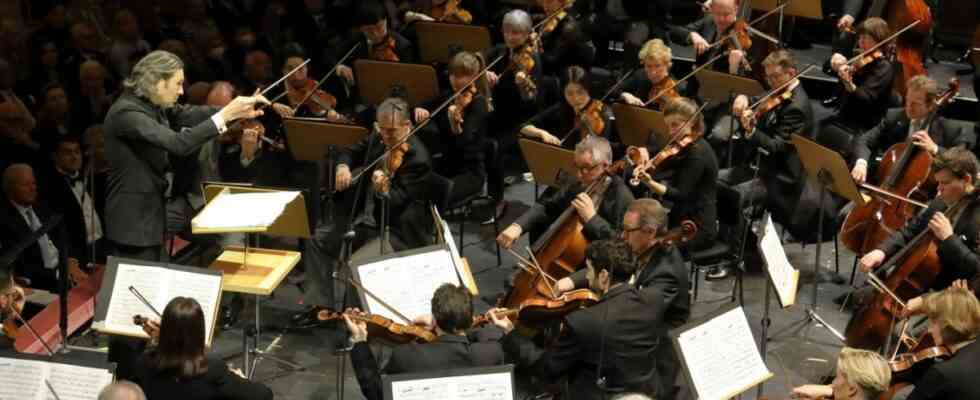If there had been a state election on Sunday, at least among the 2100 guests in the National Theater, the incumbent Prime Minister Markus Söder could have hoped for approval results in the single digits at best. The reason for Söder’s profound self-dismantling was a very happy one: the Bavarian State Orchestra, i.e. the orchestra of the Bavarian State Opera, celebrated its birthday.
It was founded 500 years ago, which does not mean that the Wittelsbachs employed the 144 musicians who make up the State Orchestra today. Rather, in 1523, around 80 years before the invention of the opera genre, Ludwig Senftl was entrusted with the direction of the court orchestra, which at that time consisted of a good handful of musicians; it was the time of vocal polyphony, instrumentalists were needed above all for accompaniment and entertainment tasks.
But it doesn’t matter, back then a tradition was established that continues to this day and makes the State Orchestra one of the oldest orchestras in the world. So there will be celebrations, with a press conference, celebratory concert and state reception. Now, on this Sunday morning, the concert is interspersed with speeches, by director Serge Dorny, state parliament president Ilse Aigner, art minister Markus Blume and also by the orchestra council, so one person can’t be missing. Markus Söder is not personally present, but just sends a video message, recorded somewhere in the State Chancellery, Söder casually, without a tie, “Bavaria is a great country” – first expressions of dissatisfaction in the audience. You don’t want to hear about the election campaign here.
The state orchestra compares Markus Söder with FC Bayern
But it gets even funnier. The resentment grows when Söder points out that not only FC Bayern wins many titles. The Prime Minister is referring to the fact that the state orchestra has once again been voted “Orchestra of the Year”, which is the result of the fact that in the annual survey of the specialist journal “Opernwelt” a relative majority of the around 40 classical music critics surveyed rated the orchestra as the best of the past season lasts.
The football comparison leads to a loud “Embarrassing!” interjection, but Söder’s contribution also evokes the greatest amusement when he says that brilliant musicians are unique, whereas officials and ministers can easily be replaced. He gets applause for that, but less for the enigmatic phrase “Live and let live, play and let play”. The reference that art and culture are given maximum support in Bavaria also raises doubts, probably among those who remember that Söder put the plans for the concert hall in the Werksviertel on hold a few months ago. But since Söder is a skilled rhetorician, he comes up with a final punchline that almost threatens to be lost in the tumult of the audience: “Congratulations on the anniversary.” This is followed by a wind adaptation of a Ludwig Senftl song of bewitching simplicity, so appropriate (though a similar adaptation of a piece by Orlando di Lasso later is simply bewitching).
Claudia Roth conveys the enthusiasm that her Bavarian colleagues coagulate in words alone
At least the other speakers know what this is about. Flower: “Wow!” Aigner: “Let us be inspired by the world cultural heritage of our music”, for which she refers to works from Wagner to Strauss, which represent the core program of the festival concert, but also only depict a few decades of music history. In fact, General Music Director Vladimir Jurowski directs an unconventionally carried interpretation of Wagner’s “Meistersinger” prelude, freed from glamor and high spirits, and a performance of Richard Strauss’ “Alpine Symphony”, in which he may not quite succeed in gaining a metaphysical added value from the elaborate natural sound image – the most beautiful are the cow bells and the Schrammel music in them. But that doesn’t stop the Federal Minister of State for Culture, Claudia Roth, from jumping up enthusiastically as the last “night” fades away. She immediately conveys the enthusiasm that her Bavarian colleagues coagulate in words alone.
At the state reception, Jurowski, like Dorny before him, pointed out the impossibility of fully depicting the long history of the orchestra in concerts and the balancing act between past and future. In the program for the anniversary year, this balance will be achieved by the fact that three former general music directors will return for Academy concerts and two of them, Zubin Mehta and Kent Nagano, will conduct commissioned works initiated by them – only Kirill Petrenko not, but he has enough to do with Mahler’s Eighth. Jurowski would also have a commissioned work up his sleeve, but that will be heard in the Academy concerts on Monday and Tuesday, and at the state act concert the numerous dignitaries were apparently not to be frightened with contemporary music by Brett Dean.
The program for the anniversary year 2023 is impressive; there will be a European tour of the orchestra in late summer, a thick book, a TV documentary, you can visit an exhibition in the back foyer of the National Theater, after selected opera evenings, members of the orchestra invite you to talks in the Rheingold Bar. And they are justifiably proud of the award-winning releases on their own CD and DVD label. But one thing is missing: 200 years of music. Wouldn’t it be possible to win Ivor Bolton for a baroque programme? Alongside Zubin Mehta, he had a musical impact on Sir Peter Jonas’ era and, as a baroque specialist, was a kind of unspoken second chief conductor. Now there are Mahler and Bruckner, Berg and Schumann, Mozart, yes. Don’t trade.

